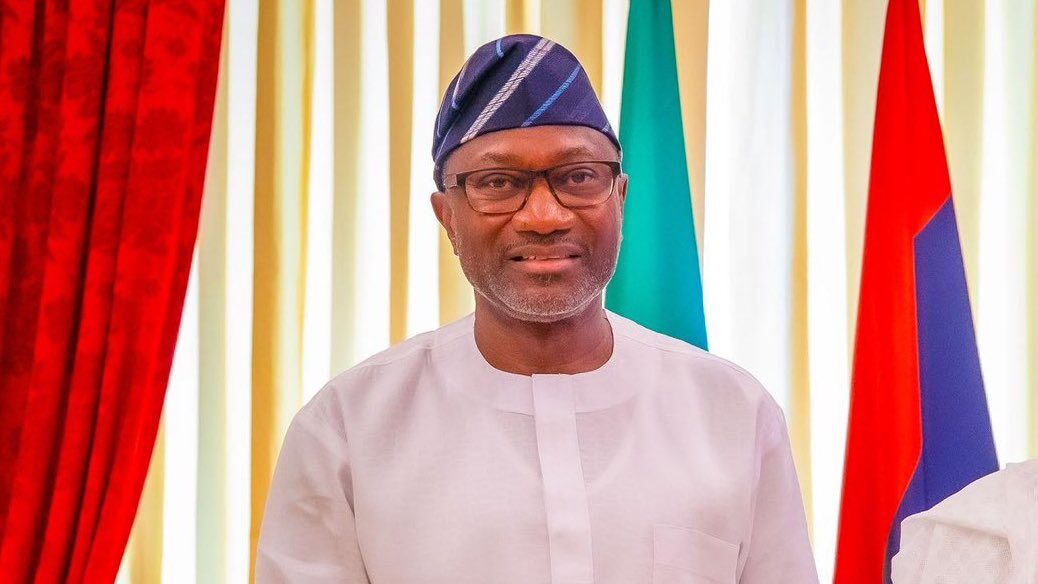China Rejects Planned US Military Action, EU Says It stands by Nigeria
China Rejects Planned US Military Action, EU Says It stands by Nigeria
•Idris assures ‘inconsistent narrative’ will be handled with utmost seriousness
•Tuggar to Trump: State-backed religious persecution impossible under constitution
•Afenifere: Trump’s threat aimed at forcing Tinubu to negotiate
Deji Elumoye, Emmanuel Addeh, Chuks Okocha, Michael Olugbode and Adedayo Akinwale in Abuja
China, yesterday, vehemently opposed the planned military action in Nigeria by the United States over alleged genocide against Christians, reaffirming its support for the President Bola Tinubu government, as it leads the country through the current turbulence.
Equally, yesterday, the European Union (EU) expressed solidarity with Nigeria, declaring full respect for the country’s sovereignty and reaffirming its commitment to strengthen cooperation in peacebuilding, interfaith dialogue, and human rights protection.
Minister of Information, Mohammed Idris, who spoke for Tinubu, expressed confidence that Nigeria will emerge stronger amid religious intolerance allegations by President Donald Trump. Idris assured Nigerians that the “inconsistent narrative” behind the US move was being handled with the utmost seriousness that it required.
Minister of Foreign Affairs, Yusuf Tuggar, said on Tuesday that state involvement in religious persecution was “impossible” in Nigeria under the country’s laws and constitution.
China stressed that Nigeria must be allowed to handle its internal challenges without undue foreign interference, maintaining that the country must toe the development path suited to its national conditions.
Addressing a press conference in Beijing, spokesperson of China’s Foreign Ministry, Mao Ning, said, being Nigeria’s strategic partner, it was against any country using religion and human rights as an excuse to interfere and threaten the West African nation with sanctions and force.
Ning was answering a question on Trump’s threat of military action in Nigeria over alleged persecution of Christians.
Trump had at the weekend asked the US Department of War to prepare for “possible action” in Nigeria and urged the Nigerian government to act fast to end the “killing of Christians” in the country.
Describing Nigeria as a “disgraced country”, the US president said, “If the Nigerian government continues to allow the killing of Christians, the USA will immediately stop all aid and assistance to Nigeria, and may very well go into that now disgraced country, ‘guns-a-blazing’, to completely wipe out the Islamic terrorists who are committing these horrible atrocities.
“I am hereby instructing our Department of War to prepare for possible action. If we attack, it will be fast, vicious, and sweet, just like the terrorist thugs attack our cherished Christians! Warning: The Nigerian government better move fast!”
Thereafter, Trump declined to rule out airstrikes as well as having US military boots on the ground in the planned intervention.
However, the Nigerian government repeatedly refuted claims of Christian genocide in the country, with Tinubu stressing, “The characterisation of Nigeria as religiously intolerant does not reflect our national reality, nor does it take into consideration the consistent and sincere efforts of the government to safeguard freedom of religion and beliefs for all Nigerians.”
The Chinese government spokesperson emphasised, “As Nigeria’s comprehensive strategic partner, China firmly supports the Nigerian government in leading its people on the development path suited to its national conditions.
“China firmly opposes any country using religion and human rights as an excuse to interfere in other countries’ internal affairs, and threatening other countries with sanctions and force.”
EU: We stand by Nigeria, support its sovereignty
EU expressed solidarity with Nigeria, declaring full respect for the country’s sovereignty and reaffirming its commitment to strengthen cooperation in peacebuilding, interfaith dialogue, and human rights protection.
EU Ambassador to Nigeria and ECOWAS, Gautier Mignot, made the remarks during an interview with the News Agency of Nigeria (NAN) on Tuesday in Lagos.
Mignot, while reacting to recent comments by Trump threatening possible military action against Nigeria, said EU’s position was guided by “long-standing partnership and shared values” with Nigeria, not external influence.
He said, “Our position is one of solidarity with Nigeria. Solidarity with the victims of violence, with the authorities working to protect citizens, and with the Nigerian people who overwhelmingly desire peaceful coexistence beyond ethnic and religious divides.
“We respect Nigeria’s sovereignty and constitutional commitment to religious neutrality.”
Mignot promised that EU was ready to enhance its support in peace, security and defence matters, as well as through dialogue with all stakeholders, including civil society organisations, and traditional and religious leaders.
Mignot, while assuring that EU would continue to implement several peacebuilding initiatives across the country to promote peaceful coexistence, said, “We also support programmes on de-radicalisation, demobilisation, and re-integration of ex-members of non-state armed groups in the North-east.”
He assured of EU’s continued commitment to the protection of all communities, especially the minorities, with the freedom of religion and belief, acknowledging that while Nigeria faces challenges in human rights and freedom of religion, its legal and institutional framework provides for fundamental freedoms.
Mignot said, “The situation is not perfect, as in any country, but there exists a constitutional basis for the protection of human rights. It is up to Nigerian authorities and society as a whole to uphold and strengthen this environment of peaceful coexistence.”
The envoy stressed that EU worked closely with civil society organisations on projects promoting interfaith dialogue and good relations among religious communities. He stated that EU’s support was non-discriminatory, covering all victims of violence, irrespective of the motives.
Mignot said EU’s engagement with Nigeria remained steady and predictable, adding that the cooperation between both parties is not driven by what others do but by “shared interest in a stable, prosperous, and democratic Nigeria”.
Mignot disclosed that a peace, security and defence dialogue between Nigeria and EU was expected soon as part of efforts to deepen strategic cooperation.
He emphasised that EU’s guiding principle was to help Nigeria reinforce stability and prosperity, stressing that the country’s future “lies firmly in the hands of Nigerians themselves”.
Idris assures ‘inconsistent narrative’ will be handled with utmost seriousness
Idris, who spoke to newsmen at State House, Abuja, yesterday, after a routine meeting with the president, assured that Tinubu remained calm, deploying a multi-pronged approach to addressing concerns raised by Washington, while meticulously reviewing all dimensions of the issue.
According to the minister, the Nigerian government is giving preference to constructive engagement over inflammatory rhetoric.
He stated that coordinated efforts were underway across relevant government agencies, while new channels of communication had been opened with international organisations to deepen understanding of Nigeria’s ongoing reforms and future strategies.
Idris said, “The initiative is designed to address both domestic and international concerns through transparency, sustained dialogue, and demonstrable commitment to tolerance, security, and national cohesion.
“Of course, the issue of the US threats also came up and we discussed that extensively with Mr President and Mr President is calm. He is looking at the whole situation and he is looking for ways and means of ensuring that the international community understands what Nigeria has been doing.
“Only two weeks ago, Mr President in his own desire to rekindle the security architecture of the country reinvigorated the hierarchy of the armed forces, a new Chief of Defence Staff and other service chiefs were appointed. These were all the issues that came out before the US concerns. So, that tells you that Mr President has been working assiduously to ensure that Nigeria is a country that remains safer for all Nigerians to live in.”
Idris added, “We are looking at all the issues and we don’t want to overheat discussions, but work is ongoing and we have also opened channels of communication for international organisations to understand what Nigeria has been doing better and what we intend to further do to ensure that whatever concerns that there are either domestically here or from the international communities are being answered.”
The minister stressed that Tinubu had continued to engage religious leaders across the country in sustained dialogue aimed at strengthening unity and understanding among Nigerians of all faiths.
He stated, “It is a multiple approach, discussions with the leadership of religious groups is an ongoing effort and Mr President has been meeting with them and he will continue to do so, they are all Nigerians and he is leading them. They are of course an important stakeholder in the Nigerian project.”
Idris reaffirmed that the president will continue to engage actively with the international community, not only the US, but also regional and continental bodies to strengthen cooperation in addressing security challenges and correcting misconceptions about Nigeria.
He said the government remained determined to eliminate criminal elements whose actions had contributed to misleading global narratives about the country.
The minister stated, “Mr President will continue to engage with the international community not just the US, everyone, the regional bodies …the continental bodies and everyone that we think has a role to play in ensuring that Nigeria succeeds in ridding this country of these criminal elements that are helping the world to drive this narrative to give Nigeria a very bad name.
“We know that this is not who we are as a country, so for us to be characterised as a country that is not tolerant when it comes to religion is not accurate, this is absolutely false.”
He called on Nigerians to look beyond divisive rhetoric and unite against extremists seeking to sow discord, warning that those driving false religious narratives are attempting to undermine the country’s peace and cohesion. Idris explained that Nigeria’s diversity was a source of strength rather than division.
He said, “Nigeria has Muslims and Christians and even those who even do not believe in any of these religions and our constitution guarantees everyone should practice their faith without hindrance and Mr President is going to respect that to the letter.
“Again, yes, we have these security challenges but nowhere has there been any decision to favour one religion or the other or to inflict violence over one religion. What has happened is that we have these extremists that are driving this narrative and their desired outcome is to see that this country is divided.
“We want to caution Nigerians to look deeper. This is a time for us to reflect on our nationhood to reflect on our unity, this is not the time for division, this is not the time for rhetoric, it is the time for nation building. It is the time for calling for everyone to come together so that we can continue to have the Nigeria of our dreams.
“Mr President is calm, he’s taking this of course very seriously and all those that should look at this issue are looking at them with all the responsibilities and the depth that it requires so that at the end of the day we will come out of this. We believe that we will come out of this very strongly.”
Tuggar to Trump: State-backed religious persecution impossible under constitution
Tuggar said Tuesday that state involvement in religious persecution was “impossible” in Nigeria under the country’s laws and constitution.
He was responding to a question about US President Donald Trump’s warning of possible “fast” military action in Nigeria if it failed to crack down on the killing of Christians by Islamist insurgents.
Speaking in Berlin alongside his German counterpart, Johann Wadephul, Tuggar pointed to Nigeria’s “constitutional commitment to religious freedom and rule of law,” a Reuters report said.
“This is what shows that it’s impossible for there to be a religious persecution that can be supported in any way, shape or form by the government of Nigeria at any level, be it federal, be it regional, be it local, it’s impossible,” he said.
The Nigerian presidency had said it would welcome US help in fighting Islamist insurgents as long as the country’s territorial integrity was respected.
In Northern Kaduna, one of the northwestern states most affected by violence against Muslims and Christians, leading Muslim cleric Ahmed Gumi said Trump’s comments risked further inflaming tensions in the country.
Gumi, who had faced criticism for negotiating with armed groups, said the government should work to reduce poverty in northern Nigeria to help end insecurity.
APC’s inept foreign policies to blame for current situation, says Olawepo-Hashim
A former presidential candidate, Olawepo-Hashim, said the responsibility for the ongoing diplomatic crisis between Nigeria and the US over alleged Christian genocide rested squarely with the administration of Tinubu, not with US president.
Olawepo-Hashim said the diplomatic standoff reflected the Tinubu government’s “reckless and self-serving foreign policy,” which prioritised personal, political, and pecuniary interests over Nigeria’s national security and global reputation.
He stated, “It is deeply troubling that, as we speak, Nigeria does not have ambassadors in many key countries. The bi-national and bilateral commissions established to address pressing concerns on security and trade have collapsed for over a decade.”
He lamented that after “paralysing” institutional mechanisms for diplomacy, the ruling All Progressives Congress (APC) government had resorted to using “a motley crowd of poorly informed operatives and international outlaws pushing shady interests incoherently and dangerously.” He described this as “a Janjaweed foreign policy, which is truly disgraceful and embarrassing”.
Recalling Nigeria’s proud legacy as a stabilising force in Africa, he stated that the country once stood tall as a reliable partner that brought peace to West Africa through ECOMOG and played leading roles in peacekeeping operations in Congo, Darfur, Liberia, and Sierra Leone. “Our current predicament is both tragic and disgraceful,” he lamented.
The politician faulted attempts to downplay reports of targeted killings, saying such arguments are “fundamentally faulty”.
He further alleged that grave human rights violations were being committed daily by supporters of the ruling APC while the administration looked away. He warned that open threats by party loyalists against groups of voters suspected of not supporting Tinubu in 2027 amounted to international crimes under the Rome Statute, which Nigeria had domesticated.
“These threats are directed at an ethnic group that predominantly practices one faith,” he said.
“Such acts cannot be dismissed as internal affairs when Nigeria is a signatory to many international human rights conventions,” he added.
Olawepo-Hashim called for an urgent national dialogue to chart a new course for Nigeria’s national security and foreign policy architecture.
“Genuine patriots must begin consultations to rebuild a framework that ensures peace, stability, and the preservation of Nigeria’s sovereignty,” he said.
Afenifere: Trump’s threat aims at forcing Tinubu to negotiate
Pan-Yoruba socio-political organisation, Afenifere, stated that the recent threat by Trump to invade Nigeria to “fight” terrorists was a decoy to mask his displeasure and to force Tinubu to negotiate with him.
By sounding harsh, Afenifere said Trump hoped to get Tinubu to negotiate with him with a view to having more inroad into Nigeria’s economy and to possibly force Nigeria to buy more goods, especially weapons, from America.
Its factional National Publicity Secretary, Jare Ajayi, in a statement issued Tuesday, maintained that the claim that the government was complicit in terrorists’ killing of Christians in Nigeria was not only unfounded, but an attempt to “give a dog a bad name to have a justification to kill it”.
Maintaining that there are extraneous reasons behind the stand of the American President, Afenifere stated that the major reason for the posture was economic and the attempt to drum it into the everyone’s ear that “America is the lord of the manor” as far as the world is concerned.
Afenifere stated that Nigeria’s recent rapport with China does not seem to go down well with the US, adding that some interests in America do not like the principled positions being taken by the Tinubu administration on some issues.
It said for instance that Vice President Kashim Shettima did not mince words when he expressed Nigeria’s preference for a two-state arrangement for Palestine and Israel when he represented the country during the last United Nations’ General Assembly in New York.
Afenifere said that Nigeria is a sovereign country, saying the matter at hand falls within the purview of what the government could and should deal with.
It stated, “It is a known fact that the claim of genocide against Christians in Nigeria is not valid. Not that people are not being killed. The reality is that bandits and terrorists do not discriminate.
“Their target is the economy. Those funding them are interested in the mineral resources underground. So, they sponsor bandits to cause mayhem in places where they spot mineral resources. When the people in those areas are displaced, the ‘sponsors’ step in and begin to exploit the resources.”
Afenifere emphasised that Trump can use any excuse to induce or escalate tension in different parts of the world.
It said, “It is not for nothing that he ordered that the Department of Defence in his country should be renamed ‘Department of War’. Thus, Nigerians should refrain from acting in a manner or making pronouncements that those who may want to create theatres of war would have justifications for doing so.
“There is no doubt that Nigeria needs all the help it can get to tackle its security challenges. Threatening it with a war is not the way to help. If anything, such would escalate the already undesirable situation.”
•Idris assures ‘inconsistent narrative’ will be handled with utmost seriousness •Tuggar to Trump: State-backed religious persecution impossible under constitution •Afenifere: Trump’s threat aimed at forcing Tinubu to negotiate Deji Elumoye,
Read more





